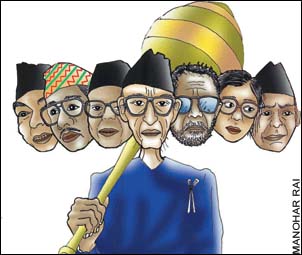 A fortnight after former prime minister Girija Prasad Koirala linked the widening anti-corruption dragnet to a thickening plot to throttle democracy, we're still missing his larger point. The democracy-corruption link he brought up needs to be probed in its full depth if we are to enrich our understanding of both.
A fortnight after former prime minister Girija Prasad Koirala linked the widening anti-corruption dragnet to a thickening plot to throttle democracy, we're still missing his larger point. The democracy-corruption link he brought up needs to be probed in its full depth if we are to enrich our understanding of both. To be sure, Koirala is at an obvious disadvantage here. He's been prime minister the longest in our dozen years of democracy. Mention some of the sleaziest scandals of the period and his name just seems to pop up everywhere. Nepotism and favouritism are nouns most prominently associated with the country's most famous political surname. When Koirala castigates the government for covering the putrefaction of the partyless decades, he draws the loudest jeers. Those who recall how he could have decimated the panchas with the Mallik Commission findings but didn't don't want to listen to his paeans to perfection.

Before you come around to concluding that politics is too serious a matter to be left to politicians, you mustn't disregard one distinction. The current anti-corruption campaign is rooted in laws adopted by the very people we demonise as depraved. Koirala's predominance probably entitles him to part of the credit.
Ridicule is something the ex-premier has confronted from the moment he described the success of the People's Movement as a victory for the panchas, too. As the Maoist insurgency was becoming bloodier, he regretted the decision to do away the panchayat-era zonal commissioners. Earlier this year, he dismissed the Nepali Congress majority in the House of Representatives as amounting to nothing. See how easily Prime Minister Sher Bahadur Deuba dissolved the chamber? Would the broader democratic alliance have drawn such derision had Krishna Prasad Bhattarai made the call?
Koirala has put his finger on a more profound issue this time. Can endemic corruption ever be a justification to end democracy? Koirala recollected how such allegations were used to oust Nepal's first elected government 42 years ago. The worst evidence of malfeasance the post-satra sal generation associates with the time are the Indian banknotes the soon-to-be panchas said they recovered from the prime minister's residence. A more exhaustive study of the money-politics link of the fifties would have to delve deeper into the contributions of Subarna Sumshere and Mahabir Sumshere to our democratic struggle.
Since only the living can be libelled, that part of history is as good as dead for purposes of settling scores. The philosophical relevance of the inquiry persists. For today's political class, corruption has become a compulsion. In terms of conspicuous consumption, the panchas looked like saints because they could afford to. Austerity can be a clear disadvantage in a highly competitive arena. To prosper, politicians need to pamper, patronise, plead, pressure and promise. The only thing that links those five, apart from the letter P, is pelf. Once you get this straight, it becomes easier to understand how people once considered paragons of probity could plunge so deep into debauchery. And once that's clear, you realise that being corrupt isn't being undemocratic.
There is anecdotal evidence in our part of the world suggesting that a populace tormented by political licentiousness is slow to recognise threats to personal liberties. The fact that the reactionary right considers this sufficient to strike at the heart of the system reflects their disconnect with the public pulse. What they also overlook is the power of common cause in uniting the bitterest rivals. The "liberal panchas"-an oxymoron one would have thought-who detected how Kangresis and comrades started hating the system more than they did each other could easily secure their place in the Rastriya Prajatantra Party.
A more instructive parallel goes back a generation. The Gorkha Parishad-billed as the party of the waning Ranas-was thought to be sworn to the Nepali Congress' annihilation. (Actually, its forerunner was the only non-state party gunning for BP Koirala's life). When politicians were caught between submission, incarceration and exile, the main opposition party in the dissolved parliament cooperated and later merged with the Nepali Congress to fortify the struggle to restore democracy. Even if the UML were to join hands with the Nepali Congress in a third movement to restore democracy, there's a scary side of history: three decades of corruption AND coercion.


